Nutrition Research
-
Micronutrients
-
Food & Beverages
Summary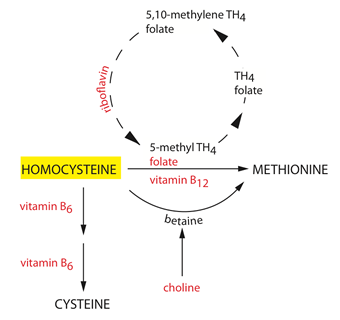
High homocysteine concentration in the blood is associated with an increased risk of cardiovascular disease (CVD). Therefore, homocysteine-lowering strategies are being investigated for their ability to reduce the risk of CVD. Nutrients involved in the metabolism of homocysteine include folate, vitamin B12, vitamin B6, riboflavin, and choline. Although supplementation with folate, vitamin B6, and vitamin B12 successfully lowers homocysteine concentration in the blood, no significant effect on CVD risk has been demonstrated. There is some evidence that riboflavin supplementation may lower homocysteine and blood pressure in individuals with a certain genetic predisposition.
Condition Overview
Homocysteine is an amino acid that is an intermediate in the production of two other amino acids, methionine and cysteine. Although homocysteine is naturally present in our bodies, too much homocysteine in the blood has been associated with an increased risk of CVD, including venous thrombosis, atherosclerosis, high blood pressure, coronary heart disease, and stroke. Most research indicates that a plasma homocysteine level less than 10 micromoles/L is associated with a lower risk of CVD.
See below for specific information about nutrients and dietary factors relevant to high homocysteine.
DEFINITIONS
Metabolism - a biochemical transformation
Venous thrombosis - a blood clot that forms in a vein
Nutrition Research
DEFINITIONS
Test tube (in vitro) experiment - a research experiment performed in a test tube, culture dish, or other artificial environment outside of a living organism; in vitro is a Latin phrase meaning in glass
Animal experiment - a research experiment performed in a laboratory animal; many different animal species are studied in the laboratory, including terrestrial (land), aquatic (water), and microscopic animals
Observational study - a human research study in which no experimental intervention or treatment is applied, and participants are simply observed over time
Randomized controlled trial - a human research study in which participants are assigned by chance alone to receive either an experimental agent (the treatment group) or a placebo (the control group)
Placebo - a chemically inactive substance
Choline
What it does
General
-
Humans can synthesize small amounts of choline but not enough to support health. Therefore, choline is considered an essential nutrient and must be consumed in the diet.
-
Choline functions as a vital structural component of cell membranes and some proteins.
Homocysteine-specific
-
Choline is a precursor to betaine, a compound that participates in a reaction that converts homocysteine to methionine. Choline supplementation is therefore being investigated as a potential homocysteine-lowering strategy.
What we know
-
Dietary intake of choline and betaine were not associated with coronary heart disease risk in a large observational study conducted in middle-aged men and women.
-
Two preliminary randomized controlled trials indicated that supplementation with large doses of choline or betaine decreased plasma homocysteine levels in healthy men and CVD patients.
-
However, there is insufficient evidence to demonstrate that increased intake of choline affects CVD risk.
For references and more information, see the section on high homocysteine in the Choline article.
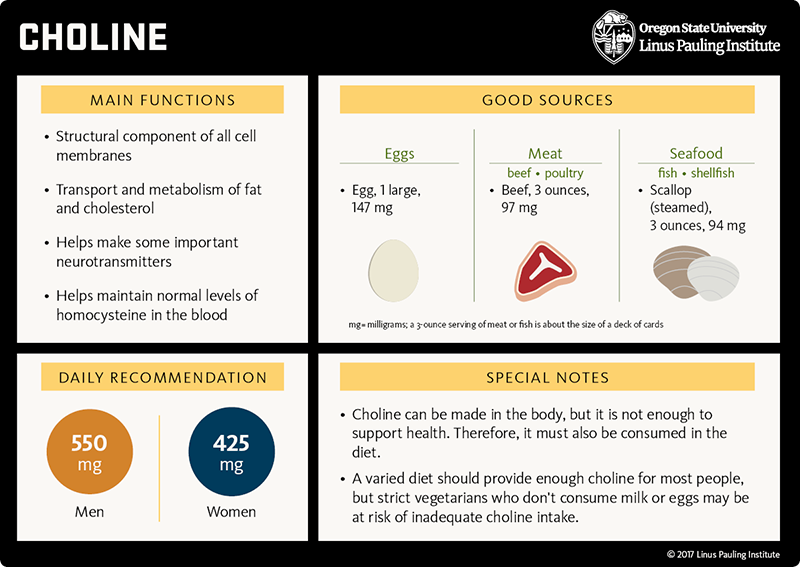
[Download PDF]

Folate
What it does
General
-
Folate is a B-vitamin required for DNA synthesis and the formation of new cells.
-
Additionally, the B-vitamins folate, vitamin B12, and vitamin B6 work together to maintain normal concentrations of homocysteine.
What we know
-
Folate-rich diets are associated with a lower risk of cardiovascular disease (CVD), including coronary artery disease, heart attack, and stroke.
-
Increased intake of folate from food or folic acid from supplements decreases homocysteine concentration in the blood.
-
Homocysteine-lowering therapy with supplemental B vitamins (folic acid, vitamin B6, and vitamin B12) may be particularly useful in lowering the risk of stroke but appears to have little utility in the prevention of other cardiovascular events.
For references and more information, see the section on Cardiovascular disease in the Folate article.
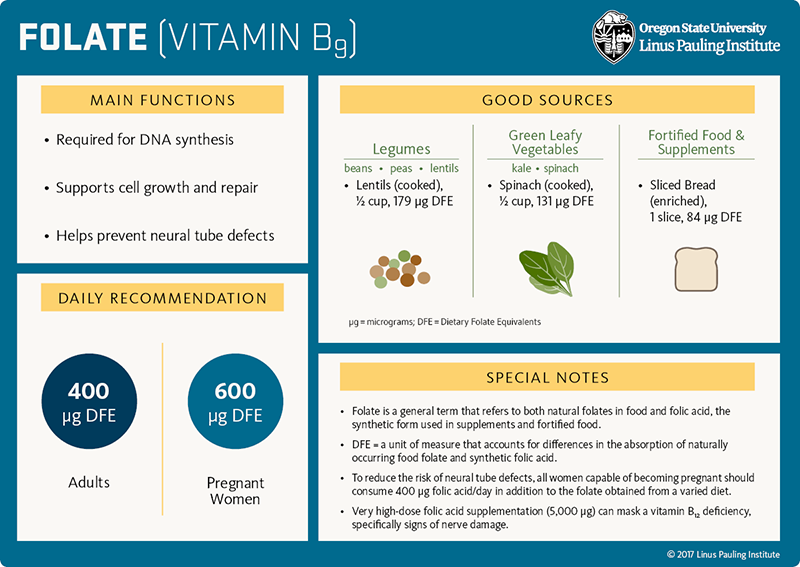
[Download PDF]

Riboflavin
What it does
General
-
Riboflavin is a B-vitamin that assists several metabolic and antioxidant enzymes and helps convert food into usable energy.
Homocysteine-specific
-
By assisting the enzyme MTHFR, riboflavin helps convert folate to a form required for the transformation of homocysteine to methionine.
What we know
-
Individuals with a certain genetic variation (polymorphism) in MTHFR may have an increased risk of developing high blood pressure, cardiovascular disease, and cancer.
-
In hypertensive individuals with the MTHFR c.677C>T polymorphism (homozygotes), low-dose riboflavin supplementation lowers both homocysteine concentration and blood pressure.
HIGHLIGHT
The MTHFR polymorphism is measured by genetic testing. In a genetic test, a small amount of blood, saliva, or tissue is used to isolate and determine an individual’s genetic information. Genetic testing is voluntary; doctors and genetic counselors can advise you on the decision to have this type of test.
Source: National Human Genome Research Institute
For more information, see the Riboflavin article.

[Download PDF]

Vitamin B6
What it does
General
-
Vitamin B6 helps convert food into usable energy and assists in the formation of neurotransmitters, red blood cells, and DNA.
-
Additionally, the B-vitamins folate, vitamin B12, and vitamin B6 work together to maintain normal concentrations of homocysteine.
What we know
-
Supplementation with vitamin B6 alone does not appear to lower homocysteine levels in the blood.
-
However, numerous randomized controlled trials have demonstrated that supplementation with a combination of vitamin B6, vitamin B12, and folic acid lowers homocysteine levels in individuals with vascular dysfunction or hyperhomocysteinemia.
-
Despite the homocysteine-lowering effect, vitamin B6 supplementation (in combination with vitamin B12 and folic acid), does not appear to have a strong influence on the prevention of cardiovascular events or on cardiovascular disease risk reduction.
For references and more information, see the section on homocysteine in the Vitamin B6 article.
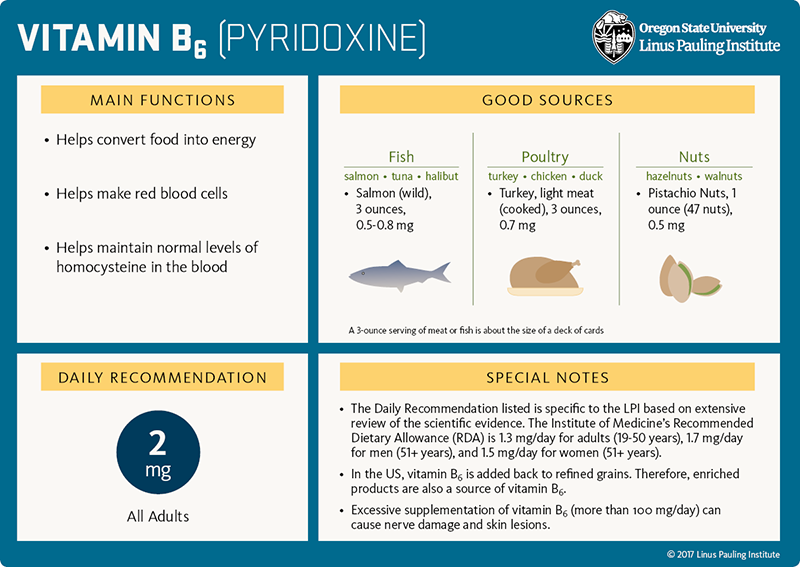
[Download PDF]

Vitamin B12
What it does
General
-
Vitamin B12 helps convert food into usable energy, make red blood cells, and is required for proper nerve function.
-
Additionally, the B-vitamins folate, vitamin B12, and vitamin B6 work together to maintain normal blood concentrations of homocysteine.
What we know
-
Vitamin B12 deficiency is common in individuals over 60 years of age and may contribute to elevated blood homocysteine.
-
While supplemental folic acid has the greatest homocysteine-lowering effect of the B-vitamins, co-supplementation of folic acid plus vitamin B12 can lower homocysteine levels even further.
-
In spite of the homocysteine-lowering effect, B-vitamin supplementation does not appear to have a strong influence on the prevention of cardiovascular events or on cardiovascular disease risk reduction.
For references and more information, see the section on homocysteine in the Vitamin B12 article.
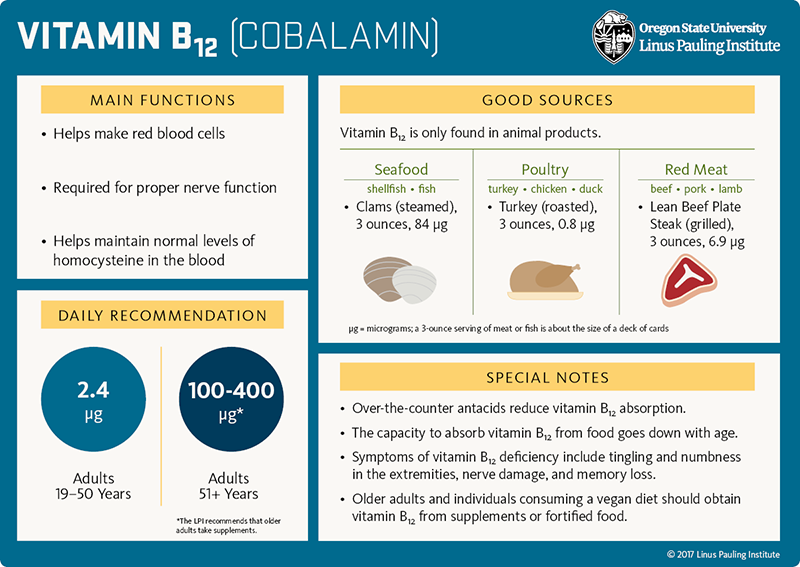
[Download PDF]

Coffee
What it does
General
-
Coffee is a complex mixture of chemicals. In addition to caffeine, coffee contains several phytochemicals that can influence human health.
What we know
-
Higher coffee intake has been associated with higher blood homocysteine concentration.
-
Randomized controlled trials have confirmed the homocysteine-raising effect of coffee intakes of about four cups/day.
-
Although coffee consumption increases blood homocysteine concentration, there appears to be no significant association between moderate coffee consumption (three to four cups/day) and the risk of coronary heart disease.
For references and more information, see the section on homocysteine in the Coffee article.
Additional reference
-
Eilat-Adar S, et al., Nutritional Recommendations for Cardiovascular Disease Prevention. Nutrients. 2013;5:3546-683

